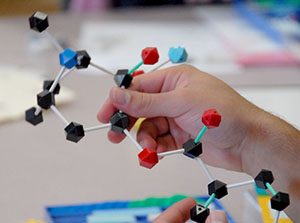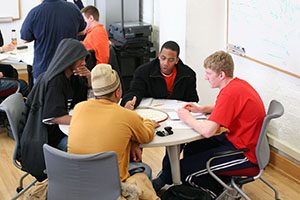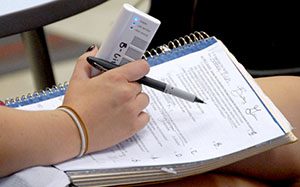The Merit Program has been an important part of the College of Liberal Arts and Sciences since it began in the Department of Mathematics in the late 1980s. Shortly after, it expanded into the Chemistry Department in 1992, and Merit courses were added for biology classes in the early 2000s. Today, approximately one-thousand University of Illinois students participate in a Merit Program course each semester, and over 40 course sections taught in the Merit style are offered in the fall and spring semesters. These Merit program workshop classes are connected to large lecture courses in first and second year chemistry, integrative biology, molecular and cellular biology, and mathematics courses. We invite you to consider becoming a Merit Program Scholar.
Merit Program for Emerging Scholars
 Merit-style teaching consists of using a highly trained facilitator-instructor to stimulate student-student interactions by providing challenging problem sets or other activities for the students. The facilitator provides feedback as the students work together in small groups, and also encourages everyone in the group to interact and discuss each student’s strategies.
Merit-style teaching consists of using a highly trained facilitator-instructor to stimulate student-student interactions by providing challenging problem sets or other activities for the students. The facilitator provides feedback as the students work together in small groups, and also encourages everyone in the group to interact and discuss each student’s strategies.
The Merit program implemented here at the University of Illinois at Urbana-Champaign is based on the models of Uri Treisman.
The Merit Program is a challenging program for a select group of undergraduates. The program targets students with high potential who are members of groups, such as ethnic minorities and women, who tend to be underrepresented in the areas of science, mathematics and engineering. The program also targets students from small high schools. The Merit Program is not a remedial program. To be invited into the program, students must have high academic potential and be committed to excellence.  One of our main goals in the Merit Program is to develop a community of scholars among the Merit students. The students in our program work together to solve difficult course problems, develop friendships based on common academic interests, and inspire each other to maintain a high level of commitment to excellence.
One of our main goals in the Merit Program is to develop a community of scholars among the Merit students. The students in our program work together to solve difficult course problems, develop friendships based on common academic interests, and inspire each other to maintain a high level of commitment to excellence.
Learning in the Merit Program is not a passive activity in which students absorb facts from a teacher as a sponge absorbs water. Merit students are responsible for learning through active participation in both the teaching and learning process. In order to “think like a chemist, mathematician, or biologist”, students must learn to solve complex problems by understanding the fundamental concepts, not simply using algorithms to get correct answers.
 To achieve this level of understanding, students learn from a variety of sources:
To achieve this level of understanding, students learn from a variety of sources:
- Lecture: to obtain an overview of the concepts.
- Text reading: to obtain the details of concepts and samples for solving problems.
- Homework: to practice solving problems individually.
- Discussion sections: to interact with other students and instructor to learn concepts and problem-solving.
